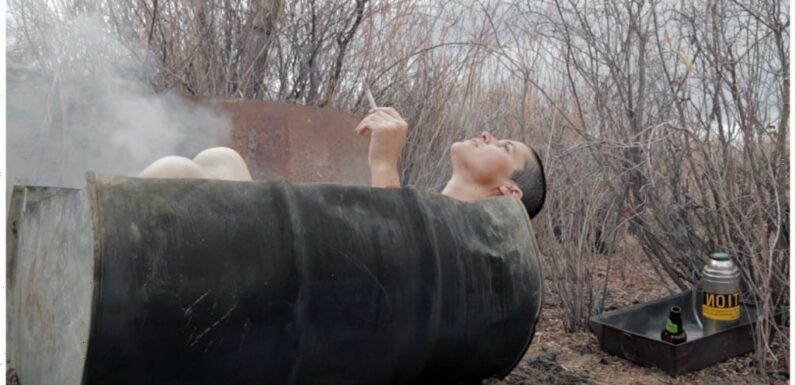
Eileen Muza is the only year-round resident of Cisco, Utah, a ghost town established all the way back in the 1880s and commemorated in Ridley Scott’s “Thelma & Louise.” Tourists, who would occasionally stop by, saw sad remains of the past. Eileen saw potential.
“One person’s throwaway is another person’s treasure,” says Emily Kaye Allen, the director of “Cisco Kid,” which world premieres at Ji.hlava film festival this week.
“When I first met Eileen, who now uses ‘they/them’ pronouns, they didn’t have a solid plan. They had ideas about what this place could be, but they went into it pretty spontaneously and impulsively.”
Eileen ended up fixing old buildings and turning the place into an artist residency. But Allen, who accompanied Eileen for three years, focuses on the very beginning.

“They are still there, but they might not be able to stay,” she says.
“Whether it works out or not, what Eileen does is hopeful and inspiring. They just bought another piece of land and there is barely a skeleton of what used to be a pig shed. Now, they are turning it into a house.”
Allen’s film could be seen as a commentary on the housing crisis, with Muza’s choice an extreme answer to a complicated problem.
“Eileen’s dad used to say that the only way out of poverty is to own a house. He was a mailman who supported five kids. It would be much harder to achieve that now in America,” points out the helmer.
“Before living in Cisco, Eileen was in Chicago. They said to me: ‘I felt less secure there than I do here.’ Mostly because rent was always going up. There is a bigger story about this fantasy that we have, about going somewhere and buying our own land, and doing our own thing.”
She didn’t want to glorify Muza’s lifestyle, however.
“When you see these new trends like ‘van life,’ there is a certain dose of romanticism around it. But it’s not an ideal landscape,” she says.
“They can’t grow vegetables there and Cisco is right off a freeway. There are all kinds of strange things about choosing that spot. I wanted to see how they would deal with that.”
Or deal with people who keep driving by or taking photos, not realizing the land they are walking on is somebody’s home.
“I thought it would be a much quieter film,” laughs Allen.
“Eileen is contradictory, because they also love attention. They like to tell their story. But having all these people just show up like that, walking around the property, felt disrespectful to them. They would go: ‘At least come talk to me, I live here.’ Many people don’t know that.”
Most passersby, especially women, are curious about their decision to live there alone. A risky choice, says Allen, but one that can also feel liberating.
“Eileen and I talked about it a bit. They said: ‘Men just don’t get it. It’s different for women to choose to be alone.’ We have been told that we can’t.”
Still, the landscape was as interesting to her as her complicated protagonist, she admits. Or rather, it was the combination of both.
“Had I met Eileen in Chicago, I don’t know if I would have thought: ‘I want to make a film about you.’ If I would go to Cisco, I don’t know if I would want to film it. It’s the union of the two that became interesting to me,” she says.
“They are shaping the landscape and the landscape is shaping them.”
She decided not to explain Eileen’s backstory in her feature-length debut, or the backstory of Cisco, allowing things to unfold naturally.
“I know some people would like to know more, but you can always find this information later. It’s nice to just be present and explore the place, or the themes that come up through Eileen’s experience there.”
“It’s nice to allow your mind to wander a little.”
Read More About:
Source: Read Full Article